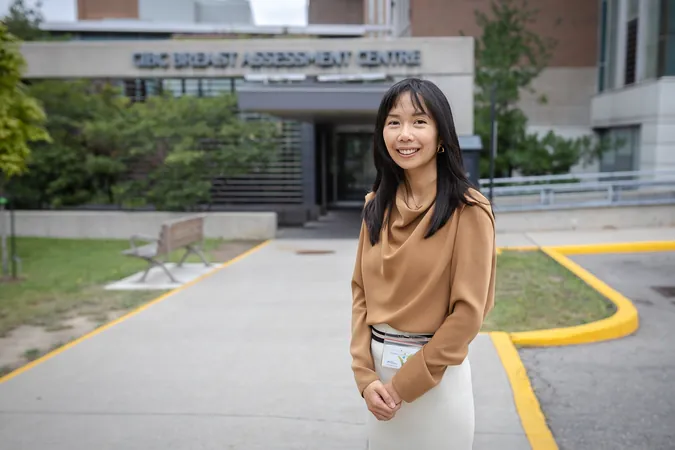
Groundbreaking Study Gives Hope to Breast Cancer Survivors Suffering from Chronic Pain
2024-09-26
Author: Sophie
Groundbreaking Study Gives Hope to Breast Cancer Survivors Suffering from Chronic Pain
As cancer treatments improve and patients are living longer, an equally important focus emerges: life after cancer. Many survivors grapple with chronic pain that persists long after chemotherapy, radiation, or surgery ends. Understanding and addressing this issue is crucial, prompting researchers to seek innovative solutions that enhance the quality of life for those affected.
One of the leading voices in this area is Dr. Karen Zhang, a psychologist at Hamilton Health Sciences' Juravinski Hospital and Cancer Centre. Dr. Zhang, who also collaborates with the Escarpment Cancer Research Institute—a partnership between Hamilton Health Sciences and McMaster University—focuses on the psychosocial impacts of cancer care. "Our goal is to empower survivors to manage their pain effectively so they can live their best lives," asserts Dr. Zhang.
A Closer Look at Chronic Pain Post-Breast Cancer Treatment
Dr. Zhang is co-leading the I-CAN Manage Cancer Pain study, alongside Dr. Greg Tippin from the HHS Michael G. DeGroote Pain Clinic. This pilot project brings together a multidisciplinary team of healthcare providers—including oncologists, psychologists, pain specialists, nurses, physiotherapists, and occupational therapists—to develop strategies for improving pain management specifically for breast cancer survivors.
Targeting women diagnosed with Stage 1 to 3 breast cancer, the study explores how ongoing pain—often resulting from neuropathy, surgical procedures, or medication side effects—affects daily living. "Many survivors face challenges in returning to work and managing regular activities due to chronic pain," Dr. Zhang explains.
Significant Investment into Research
Thanks to a generous grant of over $48,000 from the HHS Foundation, the study has been able to recruit a specialized research coordinator to facilitate the project. “The importance of supporting research is profound,” emphasizes Anissa Hiborn, CEO of the HHS Foundation. “Women must receive continued support after treatment, and Dr. Zhang's work will significantly enhance their quality of life.”
Innovative Virtual Pain Management Program
Approximately 30 participants will be recruited for the study through various avenues, including the Wellwood support center and the BRIGHT Run fundraiser for breast cancer research. Participants will engage in a six-week virtual pain management program designed by the research team, which is based on proven intervention techniques.
With sessions led by a diverse team of professionals, survivors will learn self-management strategies that include exercise, relaxation techniques, and mindfulness. "By adapting an existing validated program, we can offer valuable resources more efficiently," says Dr. Zhang.
Early Positive Outcomes and Future Directions
While the study is still in the data collection phase and hasn’t yet undergone full evaluation, feedback from participants has been promising. “Focus groups have shown us that the strategies are resonating with participants,” Dr. Zhang noted.
Looking ahead, the research team could expand this pilot into a larger randomized control trial, providing further insights into the effectiveness of structured programs for breast cancer survivors. “There’s much we still need to understand about patient support during and after treatment,” Dr. Zhang reflects. Her commitment to pinpointing gaps in care may lead to revolutionary changes in how survivors manage chronic pain in the future.
As cancer treatment continues to evolve, the emphasis on post-treatment care and researching innovative solutions, like those led by Dr. Zhang, highlights a crucial next step—ensuring that cancer survivors not only survive, but thrive.









 Brasil (PT)
Brasil (PT)
 Canada (EN)
Canada (EN)
 Chile (ES)
Chile (ES)
 España (ES)
España (ES)
 France (FR)
France (FR)
 Hong Kong (EN)
Hong Kong (EN)
 Italia (IT)
Italia (IT)
 日本 (JA)
日本 (JA)
 Magyarország (HU)
Magyarország (HU)
 Norge (NO)
Norge (NO)
 Polska (PL)
Polska (PL)
 Schweiz (DE)
Schweiz (DE)
 Singapore (EN)
Singapore (EN)
 Sverige (SV)
Sverige (SV)
 Suomi (FI)
Suomi (FI)
 Türkiye (TR)
Türkiye (TR)